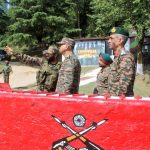Brigade 313 has returned to global headlines after a controversial June 9, 2025, interview on UK-based Sky News with Pakistani Senator Sherry Rehman, hosted by renowned journalist Yalda Hakim. The interview reignited international attention toward Pakistan’s alleged proxy warfare, spotlighting Brigade 313, a shadowy terror group with links to al-Qaeda.
What is Brigade 313?
Brigade 313 is a highly secretive, Pakistan-based militant coalition believed to be an operational arm of al-Qaeda in South Asia. The name “313” symbolically refers to the number of warriors who fought alongside Prophet Muhammad in the Battle of Badr, a motif often used to justify jihadist narratives.
Rather than a single outfit, Brigade 313 acts as a hybrid force, merging elite operatives from:
- Lashkar-e-Taiba (LeT)
- Jaish-e-Mohammed (JeM)
- Harkat-ul-Jihad al-Islami (HuJI)
- Lashkar-e-Jhangvi
- Taliban-affiliated groups
The unit reportedly functioned under the command of Ilyas Kashmiri, a former Pakistani commando turned al-Qaeda chief, until his death in a U.S. drone strike in 2011. Brigade 313 forms part of al-Qaeda’s elite “Lashkar al-Zil” or Shadow Army, known for executing high-impact terrorist operations with precision.

Sherry Rehman Interview
In the viral Sky News interview, journalist Yalda Hakim questioned Senator Sherry Rehman about Brigade 313’s alleged terrorist activities, particularly in Jammu and Kashmir. Rehman deflected questions, dismissing Brigade 313 as part of “Pakistan’s past” and insisted that Pakistan now opposes terrorism.
She labeled the accusations as “Indian propaganda” and denied state support for such groups, while failing to acknowledge ongoing links between Pakistani intelligence and terror outfits.
Despite repeated probing, Rehman avoided any acknowledgment of Brigade 313’s existence or its current status. The Pakistani government has not issued an official clarification or denial.
Brigade 313 and Proxy Warfare in South Asia
Brigade 313 plays a central role in Pakistan’s covert proxy warfare strategy, particularly:
- Cross-border terror attacks in Kashmir
- Sabotage operations in Afghanistan
- Covert missions in Balochistan
The group often carries out “white-label” attacks—incidents never formally claimed but widely attributed to it. This grants plausible deniability to the Pakistani state and al-Qaeda, while still advancing their strategic objectives.

Deep Links to ISI and Other Terrorist Organizations
Multiple intelligence sources have linked Brigade 313 with the Inter-Services Intelligence (ISI), Pakistan’s powerful spy agency. The group functions as an unofficial terror consortium, integrating cadres from:
- Pakistan’s military-intelligence ecosystem
- Radical Islamist factions across South and Central Asia
- Al-Qaeda’s operational network
The blending of ex-army personnel, trained jihadists, and ISI influence makes Brigade 313 a highly lethal and deniable force.
India’s Stand on Brigade 313
India has consistently flagged Brigade 313 as a major security threat. Indian agencies like the Research and Analysis Wing (RAW) and the Ministry of Defence link the group to:
- Cross-border infiltration
- Terror training camps in PoK
- Hybrid warfare and cyber sabotage
India has raised the issue at international platforms like the United Nations, FATF, and interpol conferences, calling for action against Pakistan for harboring and enabling such groups.
In response, India has taken countermeasures including:
- Surgical strikes on terror launchpads
- Enhanced border surveillance
- Expanded counter-terror doctrine
Blowback Inside Pakistan
Brigade 313 doesn’t only pose a threat to India and Afghanistan—it is increasingly seen as a double-edged sword for Pakistan. The state’s use of such deniable assets has contributed to:
- The rise of Tehrik-i-Taliban Pakistan (TTP)
- Sectarian strife between Sunni and Shia groups
- Uncontrollable rogue factions within its own territory
Experts argue that Pakistan may have lost control over some of these Frankensteinian creations, which now act independently or against state interests.
Global Response and International Consequences
Organizations like the FATF, UN Sanctions Committees, and the U.S. State Department have long flagged Brigade 313 as part of Pakistan’s terror infrastructure. With new attention from the Sky News interview, international scrutiny may intensify, especially regarding:
- Pakistan’s compliance with anti-terror financing norms
- U.S.-Pakistan military aid and diplomatic ties
- South Asia’s collective security frameworks
Why Brigade 313 Matters Now More Than Ever
Brigade 313 symbolizes the enduring challenge of state-sponsored terrorism cloaked in deniability. Its resurgence in the media, triggered by Senator Rehman’s evasive responses, reopens a critical debate:
- Is Pakistan still using jihadist proxies?
- What’s the cost of international silence?
- Can peace in South Asia exist without dismantling these networks?
As Pakistan claims to be a changed nation, its continued opacity around groups like Brigade 313 raises deep concerns for India, Afghanistan, and global counterterror efforts. The need for transparency, accountability, and international cooperation has never been more urgent.













